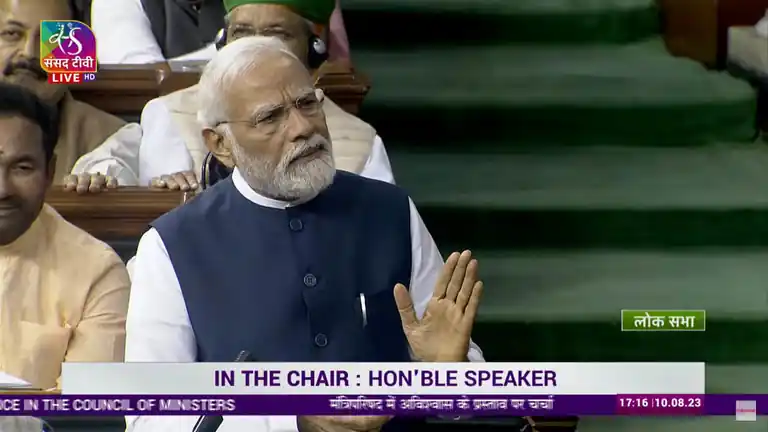
The Indian PM has addressed the issue of violence in Manipur, turning up the heat on the opposition.
Indian Prime Minister Narendra Modi turned the tables on the Congress party-led opposition during an address in parliament on Thursday. His remarks closed out a three-day debate on a motion of no confidence put forward by the opposition last month over the government’s handling of deadly ethnic violence in the northeastern state of Manipur.
The motion, as predicted, was defeated by the Modi-led National Democratic Alliance (NDA), which has 331 MPs, while the opposition’s combined strength is only 144 seats. The government won in a voice vote after the opposition staged a walkout.
This is the second time that the government has faced a no-confidence motion since it came to power in 2014. In 2018, too, there was an effort to vote down the government over the issue of granting special status to Andhra Pradesh state, which failed after a 12-hour debate.
The PM, who spoke for over two hours amid thunderous applause from his Bharatiya Janata Party-led NDA, lashed out at the main opposition Congress party for its “60-years of misrule.” Modi reiterated his criticism of the party’s reliance on a single dynasty — the Gandhi-Nehru family, pointing out the party’s strength in parliament was down from “400 to 40 seats in the past four decades.”
Modi, who drew comfort from his ruling coalition’s clear majority in parliament, mocked the opposition and claimed that a “no-trust vote is always lucky for us.” The prime minister predicted that next year’s crucial general election would see the NDA voted back into power for a third consecutive term, and that India would emerge as the globe’s third-largest economy by 2028.
The PM mentioned recent violence in Manipur, the key topic that led to the no-confidence debate, over an hour into his extensive speech. He assured the people of the troubled region that the country was with them and everyone, together, would work to ensure that peace and normalcy returns soon. He also took the opportunity to blame previous successive Congress governments in the underdeveloped state and the wider tribal-dominated northeast region for leaving behind an extremely unstable situation due to years of misrule.
On Wednesday, Congress leader Rahul Gandhi, in his first speech in parliament after being reinstated as a lawmaker, set the stage when he hit out at Modi over the Manipur violence. He labeled the Modi government “traitors,” and alleged that it had “murdered India” in the remote state. Gandhi described the PM as “arrogant” for not listening to the voice of the people, while invoking the Hindu epic ‘Ramayana,’ likening Modi to Raavan — a mythical character, who symbolizes evil.
Gandhi also triggered a row on Wednesday, when he allegedly blew a “flying kiss” in the Lok Sabha. The BJP women lawmakers lodged a complaint with Speaker Om Birla and demanded strict action against Gandhi for behaving in an “indecent manner” and making “inappropriate gestures” towards Smriti Irani [a BJP lawmaker who had defeated Gandhi in 2019] while she was addressing the House.
Meanwhile, INDIA, a 26-party opposition bloc that was formed last month, claimed it was aiming to win the perception battle by forcing the PM to speak on the ongoing ethnic clashes in Manipur. Modi is yet to visit the conflict-hit state, which has been reeling under communal clashes since May 3. One the key aims of Congress MP Gaurav Gogoi, who brought the motion on July 26, was to “break the PM’s silence” on the issue.
Modi had publicly addressed the events in Manipur only once, on July 20, the first day of the ongoing monsoon session of parliament, after a video showing two women being assaulted and paraded naked by a mob assaulted surfaced and quickly went viral, sparking global outrage.
Opposition leaders have called on the government to address the situation in the state on many occasions, while several prominent leaders, including Rahul Gandhi, have visited themselves. Over 160 people have died in Manipur and tens of thousands had been displaced following the outbreak of ethnic clashes between the majority Meitei community and the minority tribal Kukis.